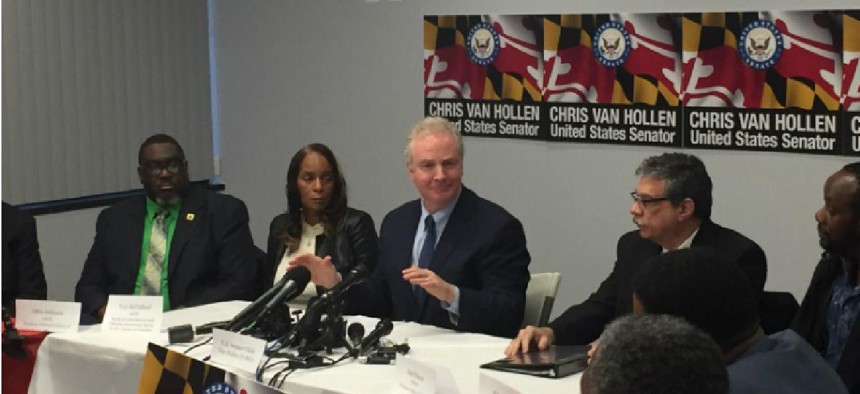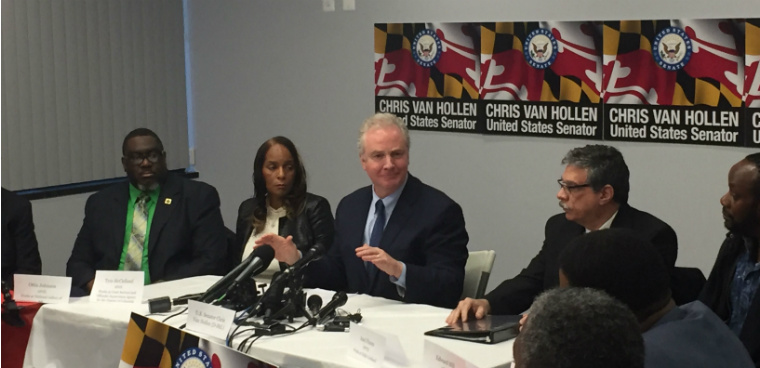Senate Dems could block bills as feds are impacted by shutdown

Sen. Chris Van Hollen (D-Md.) and a group of federal employees detailed the impact of the shutdown, calling for the Senate to pass funding bills and protections for federal employees.

Sen. Chris Van Hollen (D-Md.) talks about the problems of federal employees during the partial shutdown. (Photo credit: Chase Gunter/FCW)
Sen. Chris Van Hollen (D-Md.) and a group of federal employees detailed the impact of the shutdown, calling for the Senate to pass funding bills and protections for federal employees.
The senator held a roundtable discussion in Largo, Md., Jan. 7 with furloughed and excepted employees as well as union representatives. They detailed the impact of the shutdown on families of employees currently going unpaid as a result of the budget standoff related to the White House's wall demands.
Van Hollen, who before being elected to the Senate represented a fed-heavy district in the House, said that the language in the two bills recently passed by the House had already been approved by the Senate. However, the pair aren't expected to go anywhere, as Senate Majority Leader Mitch McConnell (R-Ky.) has not held a vote on them, and the president has said he would oppose reopening government in "pieces."
"In the United States Senate, the first order of business has to be reopening the government," Van Hollen said. "McConnell has it in his power today to bring up those two bills that passed the House to reopen the government."
To that end, Van Hollen has called for Senate Democrats to "block consideration of any bills unrelated to opening the government until Sen. Mitch McConnell and Senate Republicans allow a vote on the bipartisan bills the House passed to open the government."
Action on that front could take place as soon as Jan. 8. Van Hollen said the first vote will be a motion to proceed to a bill unrelated to the shutdown, and "Democrats will use our votes to say, 'No, we won't proceed to that bill. We've got to first proceed to the House bills to open the government.'"
Over the holiday, the Office of Personnel Management posted sample letters for furloughed employees to work with creditors and offer "the possibility of trading my services to perform maintenance (e.g. painting, carpentry work) in exchange for partial rent payments."
'A ludicrous statement'
The OPM guidance has since been revised, but Trysh Moton, a senior aerospace systems engineer at NASA Goddard, said it was indicative of the way the administration is not "reaching out and understanding how this is affecting folks" in their daily lives.
"It's not just something easy to just go talk to landlords and do some work and take care of our rent payments," she said. "That's kind of a ludicrous statement."
Eric Bunn, national vice president from District 14 of the American Federation of Government Employees, said he was not aware of the OPM guidance, but added the government should step in and work with creditors and mortgage companies to give the unpaid feds some leniency for potentially not paying bills on time.
"I don't see that in the real world," he said. "Instead of that, I should've seen someone from OPM trying to explain to these creditors that it [isn't] these American workers' fault they're not able to work and aren't getting paid."
LaVerne Byrd, an AFGE member currently furloughed from the Census Bureau, said the way the shutdown is playing out "seems like a game" to the administration. "It's not a game to us," she said.
Following the roundtable, Van Hollen said he hasn't seen any progress made since the weekend.
"I'm very concerned because the president just said the other day the shutdown could go on for months or even years," he said. "That's their whole mindset -- take it or leave it."
Van Hollen said, in the meantime, he's working on legislation both to make sure feds get paid back in a shutdown and to protect federal contractors.
In addition to ensuring feds get paid back, "we are also separately working on legislation to try and help low-wage, medium-wage contract workers who are also essentially furloughed by their businesses during this time," he said. "But everything requires getting the government up and running while we work on that."
NEXT STORY: Did House Democrats defuse the debt ceiling?


